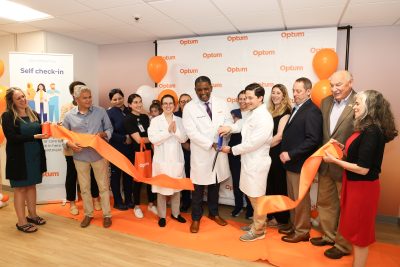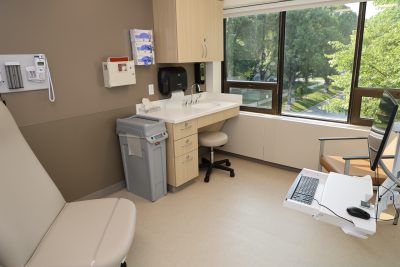New Mount Kisco Cardiology Facility Debuts as Optum Faces Ongoing Patient Concerns
News Based on facts, either observed and verified directly by the reporter, or reported and verified from knowledgeable sources.

By Tessa Wheeler
Optum Health hosted a grand unveiling of its relocated Mount Kisco cardiology center on June 5, introducing a new facility with updated technology, streamlined patient care, and reorganized referral systems — as the company continues to face community questions about its role in local healthcare.
“What’s different about it this time,” said Dr. A. Garvey Rene, Optum’s Chair of Cardiology, in an interview with The Examiner, “is that things will be all centralized and coordinated.”
The cardiology center, which was previously located in Optum’s Mount Kisco multi-speciality center, has relocated two minutes away to 100 South Bedford Road, boasting state-of-the-art technology and a larger office space—the new center has more than two times the number of exam rooms the previous center did, and space for doctors of all different subspecialties to work together.
Getting Techy With It
The new facility has much of the same technology found at the retired cardiology center, but with a notable addition: a nuclear camera
The nuclear camera (also known as a gamma camera) stretches several feet across the length of the imaging room, similar in appearance to an MRI machine. While other imaging methods show how organs look, nuclear cameras can help to discern how an organ is functioning. With the addition of this technology, Dr. Rene emphasized that patients can get a majority of cardiac testing done in one location—“anything non-invasive.”
Another doctor at the center, Dr. Lindsey Mitrani, expressed her excitement at the center’s new stress echocardiogram, a machine that takes scans of the heart while a patient exercises in a controlled environment.
“It’s great for women [who] have heart disease that’s less recognized,” she remarked. “So that’s a really great modality for them.”

Although not as high-tech as a nuclear camera, the design of the new center was also notable. The exam rooms—ergonomic and pristine—were designed with doctor-patient connection in mind, Dr. Rene said. Desks in the exam rooms move to adjustable heights easily, and can be tilted so a doctor can maintain eye contact with a patient while taking down notes.
When asked about the importance of the technology in the new center, Dr. Rene was emphatic: “If we want to transition to cardiology of the 21st century, this is the first step.”
Real Talk
Last week’s ribbon‑cutting ceremony comes amid escalating scrutiny of UnitedHealth, Optum’s $275 billion parent company, and complaints in recent years about Optum’s impact on local healthcare following its acquisition of CareMount in 2022.
At the event, Lawrence D. Shulman, who was appointed Chief Medical Officer of Optum NY/NJ just three weeks ago, appeared to make a nod to the concerns, noting mistakes of the past, and the work Optum was doing to move forward.
The Examiner conducted a followup phone interview with Shulman on Monday to ask what he was referring to more specifically.
“When you talk to the community—they love their doctors,” he explained. “But it’s been difficult for us to get the correct access for our patients. And that is really what we are trying to do. And the cardiology suite is the perfect example of putting the right doctors with the right technology in the right building to be able to interact with their colleagues. We don’t always get there, but the idea is for our patients to stay within our network.”
Dr. Shulman, who practices in pulmonology and sleep medicine, was also asked about patient access issues, and agreed it’s a credible concern.
“If our patients can’t get in to see us, then we’re not there for them,” he said.
During the phone interview, Optum communications director Dave Trausneck, who also participated in the call, responded to a reporter’s question directed at Dr. Shulman about whether the organization was acknowledging past mistakes.
“Dr. Shulman being new to the area,” he said, “he’s not really in the position to talk about the past context of this facility.”
Trausneck guided the conversation back towards the new cardiology facility.
“These improvements, they’re not going to be possible without Optum’s multi-million dollar investment over several years,” he said. “It’s about that scale and that vision that’s supporting Mount Kisco and the surrounding community.”

Heartfelt Connections
When the cardiology team was located in Optum’s multi-specialist center, subspecialists were scattered, and patient referrals were frustrating, officials said. Dr. Mark P. Abrams, an electrophysiologist, used to be in a completely different office building from many of the other cardiologists, which made referrals difficult. However, in this new office, he’ll be in the same location as everyone else.
“It’s not only fun to see our colleagues down the hall and say hi,” Abrams said of the new office, but an additional benefit was “to be able to have more easy discussions about patient management and testing, deciding what to do and doing the best for our patients.”
Dr. Rene, an interventional cardiologist, also spoke about the increased opportunities for coordinated care at the center: “If a patient comes in, and they need to see a specialist because they have an abnormal heart reading that may require a procedure, you know, literally, they can just walk across the hallway and be able to find that person.”
Furthermore, he expressed excitement about the increased accessibility of the new center.
“We will be able to take care of our community, which is a community of patients who we love, and we actually all belong to it,” he said.
‘Least Headache Possible’
In April, Democratic Congressman Pat Ryan of District 18 released the findings of a community inquiry his office had conducted on dysfunction in patient care under Optum. Among the more than 1,800 responses were complaints of worsening staff treatment under Optum, problematic bureaucracy in customer service systems, increased fees and flawed billing, as well as trouble getting prescriptions filled.
When asked whether the “streamlining” offered by the new clinic is intended to benefit patient care or serve business interests, Dr. Rene paused before responding.
“We’re doctors,” he ultimately remarked. “When we come to the office, what we care about is taking care of patients, and we want to do it as efficiently as possible, with the least headache possible. We want to get you guys the care you need.”
After Dr. Rene’s statement, Maria Hale, Optum’s Chief Patient Experience Officer, added: “Optum’s been investing millions to help [Dr. Rene] achieve this vision for the community.”
In an emailed statement following the unveiling, Dr. Rene also reaffirmed a belief in the company’s commitment to patient care.
“The center,” Dr. Rene remarked, “reflects Optum’s commitment to help clinicians deliver more connected and personalized care.”

Examiner Media – Keeping you informed with professionally-reported local news, features, and sports coverage.
